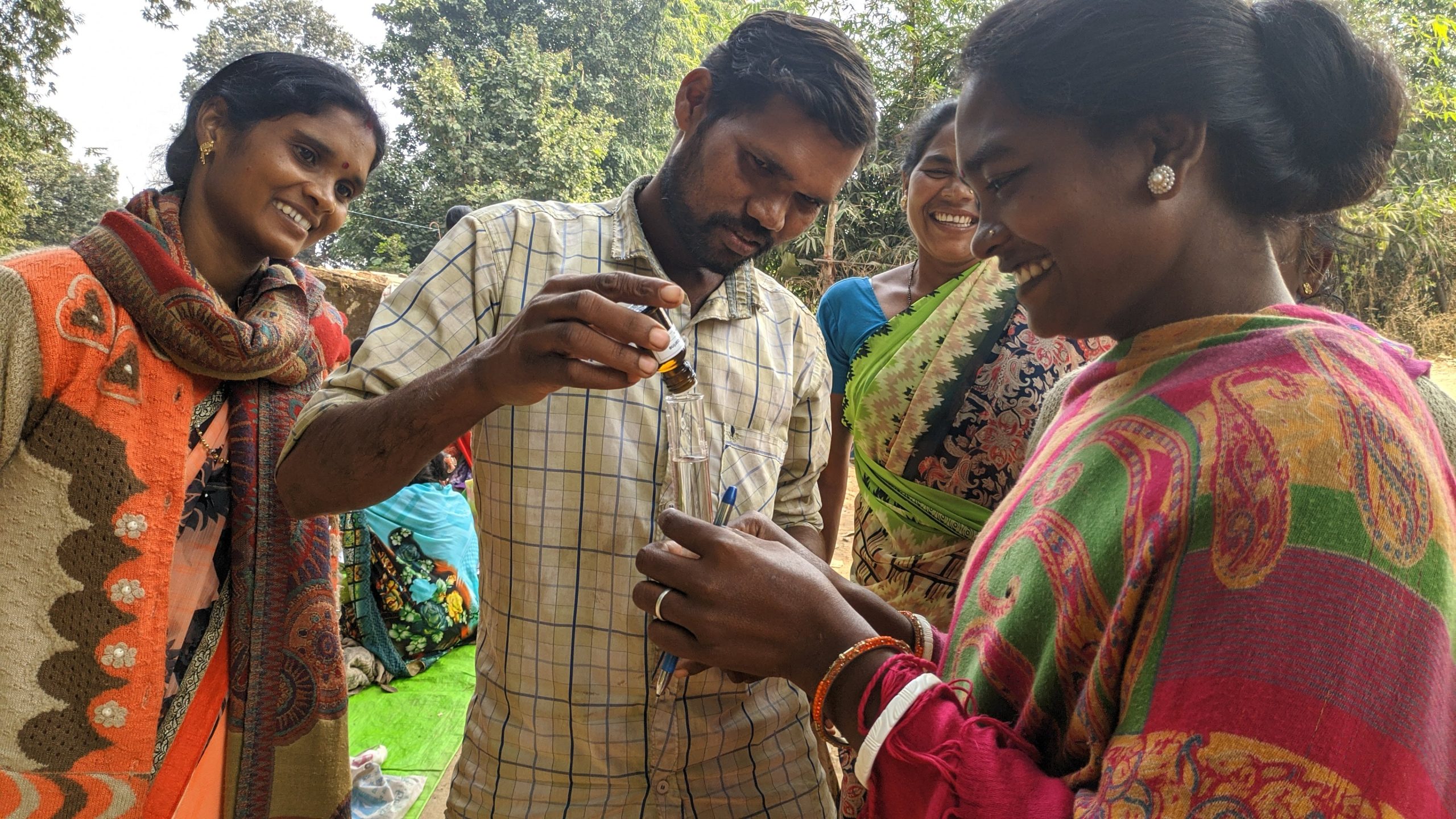Building community capabilities for managing water quality
StoryBy Sangita Patra
3 August 2020
A cadre of village level volunteers, in Jharkhand, trains in water quality testing to get clean, safe water to their communities, and safeguard their health.

Gayatri Minz, a Community Health Worker is conducting fluoride test in Silam Bartoli village in Gumla district.
Photograph by Alok Ranjan
On 7 February 2020, Gayatri Minz, a 35 year old woman, from Silam Bartoli village in Gumla district, delivered a presentation on water quality management to an audience of 200 dignitaries from the state and central governments, multilateral agencies and civil society organisations. She was at the ‘National Conference on Provision of Potable Drinking Water in Quality-affected Areas’ held in New Delhi organised by the Ministry of Jal Shakti, Government of India. Speaking at the Gram Vikas session on ‘Water Quality Surveillance and Community Involvement’, Gayathri shared about village level cadres owning and ensuring safe water in their communities in Jharkhand.
Gram Vikas’ work in water quality management (WQM) started in 2018 to enable partner communities to have access not just to water but safe drinking water – free of bacteria (causing Diarrhoea, Cholera, Dysentery, Typhoid), without nitrate (causing ‘blue baby disease’) and having an acceptable taste – throughout the year. The process involves Gram Vikas identifying and training village level cadres to test the quality of water using test kits and equipment, and district labs testing for contaminants that cannot be detected locally such as arsenic, iron, chlorine, TDS, pH and water hardness for calcium and magnesium. In Gumla district of Jharkhand, Gram Vikas, in partnership with the village communities, chose a pool of nine community cadres, one for each village.
All the 55 households in Silam Bartoli had toilets and bathing rooms by 2017 and 24×7 functional, household piped water supply by January 2019. The same year, in September, Gram Vikas conducted community level orientation sessions educating the community on the need of water testing and asking for a volunteer to undertake the process at the village level.
Gayatri Minz, the Anganwadi Sevika, also a member of the Village Water and Sanitation Committee and a self help group, expressed interest. The community unanimously agreed to it. They liked her dynamism, leadership and willingness in helping the community at all times. Gayatri worked closely with the Gram Vikas team to learn about the protocol, and testing water from the source, main pipeline and household using field test kits. They conducted three to ascertain the presence of the suspected contaminants viz. Bacteria, Nitrate and Fluoride.
In a community meeting, in December 2019, Gayatri shared the test results, educating the community about the contaminants and their ill effects on health. She elaborated on the need to protect water sources, fix leakages, and maintain the network of pipelines; and proper storage and usage of water at the household level. She persuaded upon the community the need for all of them to come together to solve the issue of contaminants if they detect it in the future.
Gayatri affirms, “It is a different responsibility and I have taken it up voluntarily, as it is my community which gets benefited at the end of the day. We have worked together with Gram Vikas and established piped water supply in our village. They have invested so much in terms of training and involving us in every step of the water quality programme. We now have the privilege of receiving water through taps within our home itself, which is an extraordinary thing for a village like ours. It is only reasonable that we maintain it and manage the issues in the future. Can’t we handle this much to get clean water?”
Gram Vikas water quality programme focuses on building community capabilities for ownership and management to ensure sustainability of solutions.
Varsha Rani conducting the nitrate test in Pakartoli village of Gumla district, Jharkhand.
Photograph by Alok Ranjan.
ACKNOWLEDGEMENT
Alok Ranjan, Cluster Manager of Gumla, supported in data collection. Priya Pillai edited the story.
ABOUT THE AUTHOR
Sangita Patra is a Thematic Manager in Gram Vikas.
RELATED BLOGPOSTS
Turning losses into gains: How Mallipanka farmers find success in new crops
Reviving agriculture: Mallipanka’s first strawberry farm story.
Ensuring dignity beyond life: supporting migrant families in their darkest hours
Gram Vikas ensures safe migration and dignified repatriation for deceased migrant workers, supporting bereaved families.
Collective leadership transforms ageing overhead water tank to secure household water supply for all
Kalakhadi’s aging overhead tank revived through collective leadership, ensuring sustainable water supply for the community.